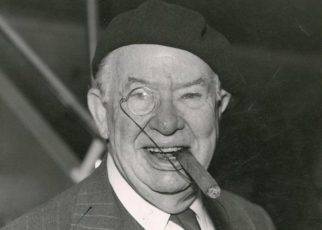Coburn was a Broadway star for much of his adult life. In fact, he didn’t even pursue a movie career until he was 60. But Coburn made up for lost time with a prolific output in some of the best Hollywood films from the late 1930s through the ’50s.
Although his roles varied to some degree, Coburn’s most lasting image was that of a no-nonsense but warm-hearted grandfather-type.
Charles Coburn a Product of Southern Gentility
Charles Douville Coburn was an only child, born in Macon, Georgia just a dozen years after the end of the Civil War. He grew up 164 miles away — in the genteel city of Savannah, which explained the Southern charm which permeated many of his roles.
Coburn gravitated early to the stage, handling odd jobs at a Savannah theater. Before he was out of his teens, Coburn was the playhouse manager. But what he really wanted to do was act. Coburn had gotten his first taste of the footlights as a boy, playing a bit part in a production of Gilbert & Sullivan’s The Mikado.
At 19, Coburn’s Broadway ambitions brought him to New York, where he supported himself as a theater usher and a package deliveryman while hoping for the proverbial big break.
Coburn Passionate About Shakespeare
It came in the form of a job as a theater advance man. This led to Coburn’s first important role, in a Chicago traveling company’s production of Quo Vadis?
He spent several years traveling with various road companies. In 1905 he founded his own troupe, the Coburn Shakespearean Players. That same year, he met his first wife, Ivah, when both were cast in a production of As You Like It. They married the next year, and over the years played in and produced many shows, both on Broadway and off.
After Ivah Coburn died in 1937, Charles picked up and moved to Hollywood, where the stage veteran began a second career at 60. In the next 21 years, he made 69 film appearances, usually co-starring or in featured roles. Coburn also burned up the cathode ray tube, making dozens of TV guest shots throughout the 50s.
Coburn Wins Academy Award As Best Supporting Actor
But his best work belonged to the 1940s, where Coburn enlivened scores of movies with that benevolent paternalism. It helped that he always looked the parts he was playing and that his soft, sanded-down voice meshed perfectly with his Old School demeanor.
In the 1938 Ginger Rogers vehicle Vivacious Lady, he was Jimmy Stewart’s authoritarian father.
He and Stewart met again the next year in Made For Each Other; this time as Stewart’s tough but ultimately tender-hearted boss.
In 1941, Coburn played Barbara Stanwyck’s card-sharp dad in Preston Sturges’ landmark comedy The Lady Eve.
Two years later, he won the supporting actor Oscar opposite Jean Arthur and Joel McCrea, as a matchmaking millionaire in The More The Merrier, working again for his Vivacious Lady director, George Stevens.
Charles Coburn a Fervent Anti-Communist
And so on it went throughout the 1940s. Among the Coburn classics were The Devil and Miss Jones (also starring Jean Arthur), Kings Row, Heaven Can Wait (the 1943 Ernst Lubitsch comedy with Don Ameche, not the unrelated 1978 Warren Beatty fantasy), Wilson and The Paradine Case, among many others.
But while Coburn was known for essentially sweet characters, he played a real-life role in Hollywood’s dastardly blacklist period. Coburn was vice president of the Motion Picture Alliance for the Preservation of American Ideals (MPA). The ultra-right wing group founded in 1944 was devoted to fighting what it regarded as communist infiltration of the American movie industry.
The group helped chase many Hollywood talents overseas or out of the industry altogether; many reputations were ruined.
Other notable members of the MPA included Walt Disney, directors Cecil B. DeMille and Leo McCarey, actors Ronald Reagan, John Wayne, Ward Bond, Adolphe Menjou, Robert Taylor and Ginger Rogers, and gossip columnist Hedda Hopper.
You Can’t Take It With You Was Coburn’s Final Performance
Coburn spent the last 15 years of his life alternating between stage and screen. Among the notable films of his later career were Gentlemen Prefer Blondes in 1953 and, three years later, Around the World in 80 Days.
Coburn remarried in 1959, when he was 82. His bride was Winifred Natzka, 41 years his junior and the widow of an opera singer from New Zealand.
In 1961, Charles Coburn played Indianapolis in a production of You Can’t Take it With You. The irony of the title came a week later, when he passed away of a heart attack in New York City at age 84.
Never mind what he took with him; what Charles Coburn left behind was a lifetime of stage and screen roles that touched millions with their grace and simple decency.




